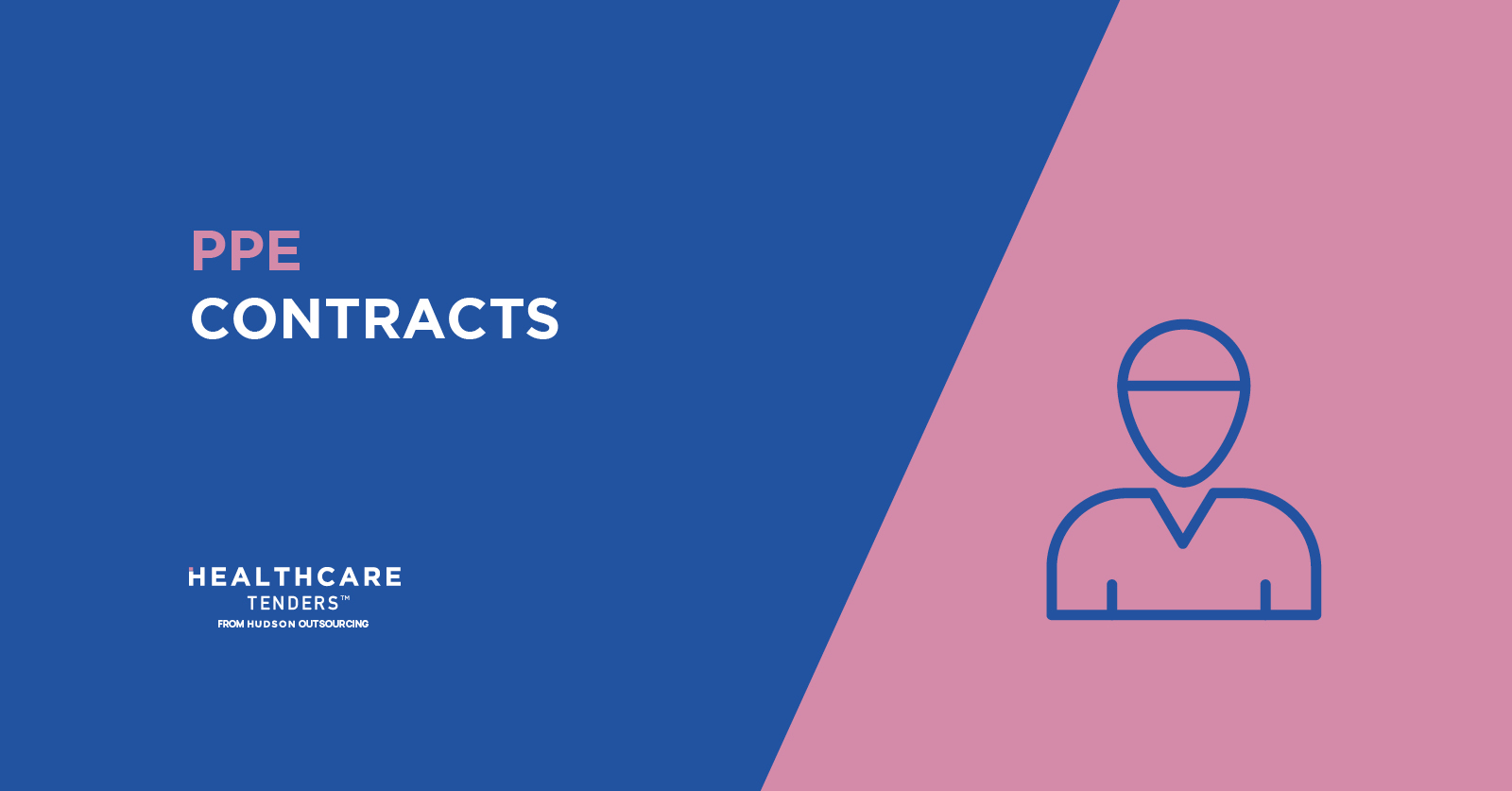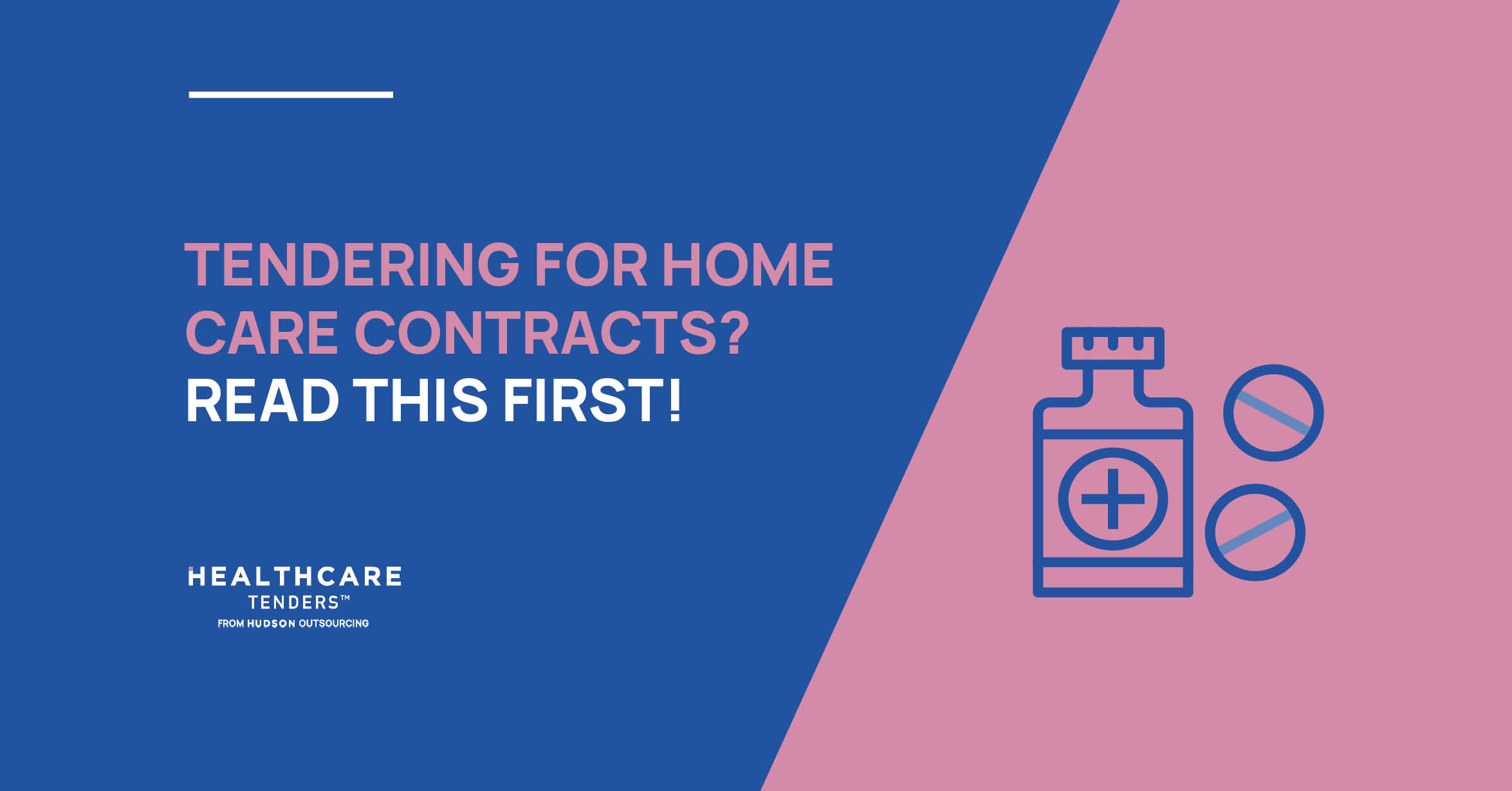Medical PPE Contracts and Tendering

Table of Contents
Medical PPE Contracts – Everything you Need to Know
Medical Personal Protective Equipment contracts (PPE) are essential to the functioning of our modern healthcare system. Without PPE, infections spread and care staff in a wide range of locations and establishments are put at risk. With this in mind, let’s look through the different aspects of PPE tenders, highlighting recent changes, alongside the tender process.
Where can I source PPE Tenders?
Wondering how you can easily source medical PPE contracts? Healthcare Tenders is a portal brought to you by Hudson Discover.
We don’t believe in CPV codes – we use real people, Opportunity Trackers, to find new contract opportunities every day. Our Opportunity Trackers scour multiple sources daily and collate a list of open contracts on our dedicated portal.
Clients use Healthcare Tenders as an essential time-saving tool. You can focus on what you do best, and we find opportunities to help expand your business.
As a Healthcare Tenders customer, you receive a daily bulletin directly to your inbox with contracts found that day.
Should I bid?
In the current climate, there has never been a greater need for PPE. If there is a framework or DPS seeking the provision of PPE, why not bid?
If you’re a PPE manufacturer/company with PPE providers, you could bid for Medical PPE Tenders right now.
An advantage of PPE tenders is that you do not have to be based locally to deliver the work. Fulfilling orders via post enables companies to be based anywhere and removes the problem of not being based locally.
Further Support
To enquire about Healthcare Tenders, click here. We can offer you a free demo to give you a taste of how the portal will help your business.
Below are previous medical PPE contracts sourced on our portal:
PQQ Single Party Framework for the Provision of PPE- Hand Sanitizer
Bus Eireann/Irish Bus- International- Budget: £1,600,000
Framework Agreement for the Supply of Disposable Gloves & Aprons
Supply Hertfordshire- Eastern- Budget: £20,000,000
Framework for the Supply of Personal Protective Equipment (PPE)
Liverpool City Council- North West- Budget: £106,000,000
Framework for Supply of Medical Face Masks to Housing & Other Bodies in Wales
Linc Cymru Housing Association- Wales- Budget: Undisclosed
Framework for the Supply & Delivery of Personal Protective Equipment PPE
Northern Ireland Housing Executive- Northern Irelands- Budget: Undisclosed
The Healthcare Tenders Portal also sources opportunities for sub-sectors including:
- Medical Supplies Tenders
- Medical Equipment Tenders
- Domiciliary care Tenders
- Mental Health Tenders
- Social Care Tenders
- NHS Tenders
- First Aid Tenders
Recent Changes
Covid-19 has raised many questions about the quantities of PPE available to key workers.
This has highlighted a larger problem in the scope of Medical PPE tenders and further emphasised their importance for tendering.
As the UK has left the EU, we will no longer be required to comply with their stipulated standards. The Brexit Health Alliance is one of the many bodies which will support the NHS and other healthcare providers.
It will be a matter of time before we are truly certain of what the future holds for the UK. This uncertainty will undoubtedly affect Medical PPE contracts and many other medical tenders.
It’s likely that most purchasing bodies will adhere to the existing EU regulations for ease and for quality assurance purposes.
It’s common knowledge that the UK has a public healthcare system. But what you may not know is that this means all contracts must be put out to tender. This includes Medical PPE contracts. Other large organisations may procure PPE via tenders for logistical ease and quality assurance.
Here are the different organisations who may seek to procure PPE:
- NHS and associated bodies
- Councils
- Private healthcare bodies/providers
- Large third sector organisations (such as UNICEF or Oxfam).
Medical PPE contracts, in a normal year, may appear periodically. However, our healthcare systems are under unusual pressure.
This means PPE tenders will continue to be published even once we are out of the Covid-19 pandemic.
It will be worth keeping an eye out for the foreseeable future. Many bodies, both public and private, continue to rely on PPE as a result of the pandemic.
This has never been a more essential time for PPE suppliers to step up.
PPE tenders will likely appear in the format of a DPS (Dynamic Purchasing System) register, or a framework agreement. These are similar yet different.
Both contracts result in multiple suppliers being successful. Framework agreements have a set deadline like a single-supplier contract. DPS registers run for years at a time, adding suppliers continuously.
If you are unsuccessful, you can tweak your response and reapply for a DPS. These formats are incredibly beneficial for buyers to ensure that they can fulfil demand.
A framework agreement or a DPS may divide the required provision into ‘Lots’ to facilitate bidding.
These lots may be geographical – providing NHS bodies or similar in certain areas of the country with all items stipulated.
Alternatively, it may be split into product types; but on a national scale.
An example of this option is as follows:
- Medical and pharmaceutical masks (Lot 1)
- Gloves (Lot 2)
- Aprons, gowns and overshoes (Lot 3)
- Eye protection and visors (Lot 4)
- General Respiratory Protective Equipment (Lot 5).
You will usually be able to bid for any or all lots – whichever requirements you can fulfil.
The tender process
There will be no noticeable difference between tenders for PPE and the typical NHS tendering process.
The process will, therefore, involve;
Selection Questionnaire – This is the first barrier for prospective suppliers to tackle, and it covers the minimum requirements for winning PPE tenders. They may also use a Pre-Qualification Questionnaire in some circumstances. Alongside this, a pricing document would need to be provided.
ITT/RFP – For the team writing the bid, this will be the heart of their process. An Invitation to Tender would include everything from timelines to requirements. Certain items of PPE will need to comply with specific legislation, for example. The exact requirements of each item will be outlined here and will need a scrutinous review from all potential suppliers. If the buyer is not looking for a good amount of detail, they may look into a Request For Proposal (RFP). This is more focused on providing the buyer with general information such as design considerations and budget.
Interview/presentation – Normally this stage in the process would be assigned to services, or products with services attached. However, PPE tenders may still facilitate the need for face-to-face presentations. In this case, you would need to prepare everything you’ve collated and present this to a Clinical Commissioning Board (CCG). Soon enough this board will be taken over by Integrated Health Systems, which performs the same role in health procurement.
Proposed products to fulfil criteria
You will need to thoroughly review the specification to ensure the products you are proposing meet the buyer’s criteria. For example, CE marking and relevant standards.
This may involve providing certificates/documents as proof. Buyers will be looking for you to explain how your products meet their needs.
If products are imported from outside of the European Union, then regulations take precedence. The manufacturer must have undergone a conformity assessment as per the PPE Regulations 2016. For example, for protective masks such as FFP2/FFP3, the conformity assessment requires the following:
- An examination from a notified body – resulting in a certificate;
- Production follows up from a notified body.
From this, CE marking can be awarded, along with the notified body’s registration number. The manufacturer (either yourself or your supply chain) must issue the following with the PPE item(s):
- An EU Declaration of Conformity;
- Instructions for use.
- Quality assurance.
4 points to consider when it comes to PPE tenders
How do you ensure the quality of your products every time?
This will be a vital question to answer whether you are bidding as a manufacturer or a supplier.
If you are a manufacturer, how do you ensure that your products are fit for purpose and compliant every time? This may include describing internal method statements, staff training programmes, equipment maintenance and periodic testing.
If you are using a supply chain to provide the products, think about your supply chain management.
How do you check that your suppliers are compliant and execute best practice? Vetting, random audits and checking policies and procedures will be crucial here.
Delivery
Most likely, orders for PPE items on the contract will be fulfilled via couriers. Buyers may want to understand the methodology for delivery, minimum order information and delivery costs.
Also relevant here, could be the use of packaging. Most buyers are geared towards choosing suppliers who can demonstrate an environmentally conscious approach. Recyclable packaging, or even better, reusable that can be sent back to you, could win you points.
Invoicing
You may be asked to describe your invoicing processes. This may be a case of confirming your conformity to the buyer’s stipulated invoicing systems/procedure or describing your own. Efficiency, transparency, and consistency are key here.
Pricing
This will usually be a separate document to the method statements. Demonstrating value for money is an incredibly important aspect of responding to any tender.
Prices should reflect the quality of the product and be sustainable for both your business and for the buyer.
Due to historic PPE shortages and current pressures, NHS bodies don’t have the funds to source expensive items. Prices should reflect the climate so that buyers can ensure the maximum number of suppliers to fulfil the ongoing shortage.
2 tips to help you win PPE tenders
Financial Threshold
Ensure that you’re choosing the right PPE tenders. For instance, if the contract value exceeds half of your annual revenue, it’s probably outside of your current capabilities. This advice is only given to avoid a failure to meet the contract should you win it. Too many suppliers overstretch and fall short of delivering the goods.
Time management
Always ensure that you’re keeping on top of PPE tenders. Your submission won’t be evaluated if it arrives after the deadline, no matter the quality. Produce some internal deadlines for yourself and the team. Organise progress meetings so that everyone is kept up to date. The more your bid is managed, the better the final product will be.
In summary
So, we’ve finished this blog on PPE tenders! Now you’re up to date with everything you need to know about winning PPE contracts.
We covered quite a bit in this blog, so you may be wondering if you could have a recap… Healthcare Tenders has you covered.
Where can I source PPE Tenders? –
Healthcare Tenders sources a wide range of PPE tenders from across the UK. Our manual tracking system helps you save time by ensuring relevancy in your search. Book a free live demo.
Recent Changes –
The impact of COVID-19 and Brexit on the supply and demand of PPE tenders. Where this leaves the healthcare procurement of further PPE. A clear outline of the organisations that procure PPE.
The tender process
Selection Questionnaire –
The initial step in some PPE tenders. Looking into the minimum requirements for the buyers.
ITT/RFP –
Either the Request for Proposal (RFP) and the Invitation to Tender (ITT) will be the heart of the tender process. Aspects such as budget, adherence to legislation, and design considerations would be considered.
Presentations/Interviews –
The last stage of the PPE tender process. The commissioning board needs to know exactly who they’re working with.
Proposed products to fulfil criteria –
Exploring the regulations for products procured outside of the E.U.
4 points to consider when it comes to PPE tenders –
- How do you ensure the quality of your products every time? – Considering internal method statements, staff training programmes, equipment maintenance and periodic testing as a manufacturer. If you’re a supplier, looking into vetting, random audits, and checking policies and procedures.
- Delivery – Buyers may want to understand the methodology for delivery, minimum order information and delivery costs. Alongside this, they’ll want reassurances that you’re providing green, sustainable supply chains.
- Invoicing – Ensuring that you conform to the buyer’s invoicing process. Outlining your own.
- Pricing – Demonstrating value for money. Generally formed into a distinct document.
2 tips to steer your PPE tenders straight
- Financial threshold – Ensuring that your chosen contract doesn’t exceed half of your annual revenue.
- Bid management – Organising a crack team to focus on each aspect of the tender. Ensuring that your team has internal deadlines for both yourself and the larger team. Setting progress meetings.
Need help writing your next tender?
If you don’t have the resources or time to write a winning bid, why not outsource it? Our sister company, Hudson Succeed, boasts an 87% success rate and have over 60 years of collective bidding experience. They offer four bid writing support packages to help you on the path to success. Whether you’re new to tendering, or simply need someone to proof your written response before you submit – we can help.
Tender Ready
Our Tender Ready programme is designed for those who have never tendered before. This 4-week programme works with you to ensure you have everything in place to tender successfully.
Tender Improvement
Tender Improvement can help if you’re already tendering but aren’t seeing success from your current efforts. Our Bid Writers will assess your previous submissions and supporting documents. They’ll give you feedback and guidance on how to improve, helping you to secure your next PPE tender.
Tender Mentor
If you’ve written a tender and need someone to proofread it – Tender Mentor is for you. A Bid Writer will double-check it’s in line with the specification and free of any grammar or spelling mistakes.
Tender Writing
If you’ve found the perfect tender but don’t know where to start – we can help. Send the specification over to us and our Bid Team will do the rest. They’ll let you know what they need from you and provide you with a full breakdown. They’ll even submit it on your behalf, leaving you more time to focus on your business.
Contact us for more information regarding our bid management consultancy services.
Want to save even more time?
Upgrading to Discover Elite will ensure you never miss a tendering opportunity even when you’re busy!
The Ultimate Time-Saving Tool offers your business:
- An annual subscription to a maximum of two Discover portals of your choice.
- Up to five bid breakdowns per month to help you make your bid or no-bid decision
- Weekly phone calls with your Account Manager to discuss viable leads and tendering opportunities.
- Award and pre-market engagement notices monitored on your behalf.
- Public and private buyer portal management including registering, password management, downloading documents and assessing viability based on your bid strategy.
Contact us for more information.
Similar Insights

Hospital Bids: The Secrets to Success
Read Article